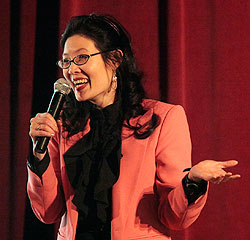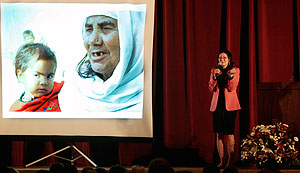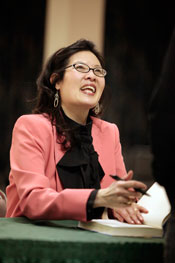WuDunn outlines plight of women around the world, offers solution
By Jessica Birthisel | March 9, 2010

First there were the horrifying pictures, such as the small, emaciated African girl with ribs jetting out of her dark skin. Or the line-up of female sex slaves, not one who looked older than 15. Or the trafficked girl whose eye was gouged out by the owner of her brothel.
The photos Pulitzer Prize-winner Sheryl WuDunn showed her audience Monday evening at Alumni Hall conveyed the thousands of words that her presentation about the condition of women around the world could only begin to express. Her talk, the first of the School of Journalism’s spring Speaker Series, was co-sponsored by the Indiana Memorial Union Board and the IU Women’s Student Association.
WuDunn and her husband, New York Times columnist Nicholas D. Kristof, are authors of a new book, Half the Sky: From Oppression to Opportunity for Women Worldwide, which exposes feudal attitudes about women ranging from sexual exploitation to quiet negligence. The two have traveled widely as journalists. They won a Pulitzer Prize for their coverage of Tiananmen Square in Beijing, the first couple to win and, for WuDunn, the first female Asian-American winner.
During her work for The Times, WuDunn reported on the tough regimes of Myanmar and North Korea, covered China and worked in the Tokyo bureau on economic and financial issues.
All of what she and her husband have witnessed as reporters, coupled with her background in finance, culminated in the new book – and her lecture. Illuminated through the photos, powerful anecdotes and alarming statistics, WuDunn’s talk laid out the challenges and a few solutions to the plight of women around the world.
WuDunn explained that the first major challenge to women is gender inequality, which she describes as one of the major challenges of this century, on par with the oppression of slavery in the 19th century and totalitarianism in the 20th century.
From birth to age one, said WuDunn, girls and boys have equal survival rates, largely due to breastfeeding; however, between the ages of one and five, a different picture emerges, with girls having a 50 percent higher mortality rate than boys.
“There is a ‘son’ preference that is carried through a lifetime,” said WuDunn, explaining that in many cultures, when resources get scarce, the boys’ health and education takes priority.
Pulling up the photo of the sickly thin girl, WuDunn added soberly that her brothers look “just fine.”
A second major theme of the book is that the education and employment of women can help reduce poverty and end extremism.
“When you educate a girl, and bring her into labor force, and she carries that education throughout, she really breaks out of this vicious cycle of poverty,” said WuDunn. “Women and girls aren’t the problem. They are the solution.”

WuDunn addressed two hurdles to liberating women around the world. The first issue is sex trafficking or, as she thinks it should be more appropriately called, sex slavery. WuDunn said that she and Kristof understood the issue intellectually, but couldn’t emotionally understand it until they began traveling and meeting some of the girls whose lives have been affected by these practices, including the woman whose brothel owner gouged out her eye after she dared to ask for more recovery time following her second abortion.
WuDunn explained that Kristof even went so far as to buy the freedom of two sex slaves in Cambodia, hoping that he might spare them a death from AIDS in the brothel.
In addition to sex slavery, WuDunn says that the second major threat to women’s well-being is maternal mortality.
“One woman dies every single minute in childbirth around the world,” said WuDunn, the equivalent of five jumbo jets full of women dying every day. “It’s not that we don’t have the solutions. We know how to prevent death in childbirth. It’s just that these women have three strikes against them: They are poor, they are rural and they are female.”
Surviving childbirth isn’t without risks, either. WuDunn said for every woman who dies in childbirth, 20 are injured in the process. One common side effect of medically-neglected childbirth is fistula, which leads to incontinence, nerve damage, psychological trauma and social repercussions.
Demonstrating both the horror and the hope in the situation, WuDunn told about a 13-year-old Ethiopian girl who became pregnant in a marriage that was arranged against her will.
“She ran away and tried to have baby on her own,” said WuDunn, explaining that the baby died and she suffered from fistula. “The villagers thought she was cursed. They didn’t know what to do with her.”
The community eventually put the girl inside a hut on the edge of the village and pulled off the door so that hyenas might attack her in the night. In the dark of night, she fended off animals with a stick and dragged herself 30 miles to the nearest village. A missionary found her and took her to a hospital, where she had surgery to repair the condition. WuDunn said the girl eventually got training to become a nurse and to treat women with the very condition that nearly took her life.
“She’s saving hundreds of thousands of lives of women who also have fistulas,” said WuDunn. “She was a victim, and now she’s part of the solution, paying back multiple, multiple, multiple times what someone gave to her.” Another fistula victim, despite her illiteracy, became a top trainer surgeon in the area of fistula repair, she said.
WuDunn offered two key solutions to the oppression of women: education and economic empowerment.
“Education is wonderful, but it’s not enough,” said WuDunn. “You need to pair it with job opportunities.”
She said microlending and microsaving provide work opportunities for women in oppressive cultures. One woman’s life was so transformed by a $65 loan that she not only ended her husband’s oppressive behavior, she eventually employed him in her successful embroidery business.
“She’s a local tycoon,” said WuDunn. “She transformed her household and she transformed the village.”
To demonstrate microsavings, WuDunn told the story of a woman in the Republic of Burundi who was never allowed to physically handle the family’s money. She formed an organization wherein a group of women all bring a dime, pooling their money. All of the money goes to one woman who invests in a business and has to pay back the loan with interest.
WuDunn told her audience that they can make a difference by donating to appropriate non-governmental organizations (NGOs) and fighting for political action. For example, one $120 Heifer International donation of a goat to a family in Uganda ultimately set off a series of unlikely events, culminating with the graduation of an African woman from an American university, she said.
In addition to helping others, WuDunn explained that generosity can lead to personal benefits as well. Studies have suggested that once one’s basic needs are taken care of, there are very few things that can actually elevate one’s level of happiness.
“One of those things that can [elevate a person’s happiness] is contributing to a larger cause, something larger than yourself,” she said.
Living in America, “we’ve won the lottery of life,” said WuDunn, adding that with that luck comes a certain responsibility.

“Here’s the cause, join the movement, feel happier and help save the world,” she concluded.
Audience member Jody Wintsch explained that she attended the event because she was a fan of Half the Sky and a regular reader of Kristof’s editorials in The New York Times.
“The talk was wonderful,” said Wintsch, who is from Bloomington. “She was just what I expected.”
After reading Half The Sky, Wintsch said she had thought seriously about microlending, going so far as to photocopy the list of resources and organizations in the back of WuDunn and Kristof’s book.
“I had been interested in the organization Women for Women International, but after hearing her stories about fistulas tonight, I may look in to how to help with that cause,” said Wintsch.
“That’s more than just giving money to support a business, it’s lending money to save a life.”
The School of Journalism Speaker Series continues March 29 with New York Times London Bureau Chief John F. Author and journalist Ken Auletta visits April 19.

